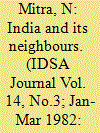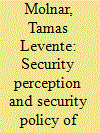| Srl | Item |
| 1 |
ID:
184928


|
|
|
| 2 |
ID:
177768


|
|
|
|
|
| Summary/Abstract |
This paper argues that the security perception in Romania has been oriented in the following 30 years after the 1989 Revolution towards a gradually implemented multidimensional approach that can be identified both in the subsequent security strategies and in the national or European public opinion polls. The case study focuses on the perception of the risks and threats affecting both the Romanian society and other countries, the identification of specific patterns, the way in which the security sector has changed over time, and the pace of adapting the security policy to the dynamics of the security environment.
|
|
|
|
|
|
|
|
|
|
|
|
|
|
|
|
| 3 |
ID:
177766


|
|
|
|
|
| Summary/Abstract |
Austria's security architecture has changed significantly following the end of the Cold War. The fall of the Berlin Wall in 1989, the country's accession to the EU in 1995, and the Yugoslav Wars in the 1990s led to a re-calibration of the Austrian understanding of foreign and security policy. As a result, Austria became more engaged in international peace-keeping operations and was interacting more with international organisations (EU, NATO-PfP). Austria became more and more engaged with EU CSDP, which de-facto undermined the country's neutrality, even if the neutrality issue keeps coming up at the level of political discourses. The public assessment of perceived threats is shifted from more traditional threat categories (e.g. crime) towards new security challenges (e.g. immigration), but in general, Austrians feel extraordinarily safe in comparison with other European nations.
|
|
|
|
|
|
|
|
|
|
|
|
|
|
|
|
| 4 |
ID:
177762


|
|
|
|
|
| Summary/Abstract |
Between 1989 and 2018, the basic characteristics of the security perception of the Hungarian society remained constant, but significant changes occurred in the realm of security policy. The security perception of the Hungarian society retained its multidimensional character, while non-military dimensions became increasingly predominant. As a consequence of the changing strategic environment and the country's accession to NATO, Hungary became a more active actor in international security policy, albeit with strict limitations on the use of force. The changes in Hungary's foreign policy orientation after the end of the Cold War can be best described as a gradual and consistent shift towards Euro-Atlantic integration, facilitated by both external and internal factors. Furthermore, the Hungarian Defence Forces began their transformation from a Soviet-type mass army into a Western-type of expeditionary model of armed forces, that has been further accelerated by a new large-scale modernisation programme since 2016.
|
|
|
|
|
|
|
|
|
|
|
|
|
|
|
|
| 5 |
ID:
177765


|
|
|
| 6 |
ID:
177770


|
|
|
|
|
| Summary/Abstract |
Croatia's security environment went through a gradual change since the declaration of independence in 1991. The changing environment is reflected on in the National Security Strategy and also in the security perception of the population. This period was marked with a solid transition of foreign policy by joining NATO and EU, and by later on fulfilling the responsibilities coming with the membership. These responsibilities include the participation in an increased number of peace support operations, and contribution to the common responses of the EU to the security threats of today. To live up to these challenges Croatia needs to develop its military capabilities, which Croatia has begun with the acquisition of air force equipment.
|
|
|
|
|
|
|
|
|
|
|
|
|
|
|
|